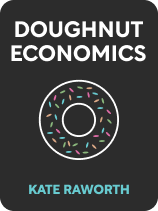

This article is an excerpt from the Shortform book guide to "Doughnut Economics" by Kate Raworth. Shortform has the world's best summaries and analyses of books you should be reading.
Like this article? Sign up for a free trial here .
What’s a distributive economy? What are the dangers in entrusting the distribution of the money supply to private commercial banks?
A distributive economy promotes an equitable distribution of the money supply. In a capitalist economy, the money supply is distributed by private banks, which gives banks too much power. In a distributive economy, government-backed financial institutions take the role of private banks.
Here’s why we should democratize money, according to Kate Raworth.
Democratizing Money
In a capitalist economy, banks create money by lending it out and earning it back with interest, then lending out more, thereby increasing the money supply. Unfortunately, she argues, entrusting banks to do this comes with some problems—private banks will often use this money-creating power to purchase or invest in assets that already exist, driving up their prices and enriching those who already own them (in many cases, the banks themselves). This drains productive resources away from society.
But this is not the way it has to be. Raworth champions a distributive economy where government-backed financial institutions take the role of private banks, with a social commitment to invest in low-interest loans for enterprises that benefit society: roads, infrastructure, education, skills training, and the environment. The government could also require banks to hold larger reserves of capital, which would stabilize the financial system and reduce the incentive for banks to ignite giant credit-fueled bubbles that melt down the financial system.
(Shortform note: These sorts of banking reforms championed by Raworth are actually quite similar to steps the Obama administration took to stabilize the banking system in the wake of the 2008 financial crisis. In A Promised Land, Obama discusses his team’s plan to conduct a stress test of the major banks—essentially, a thorough financial audit of the banks’ assets and liabilities, conducted by the Federal Reserve. Under the terms of the stress test, banks were required to hold larger stocks of capital in reserve. They could only receive further bailouts if the stress test found that they could not remain solvent without such an infusion of cash.)
She argues that central banks could also take the even more radical step of issuing new money directly to every household during a recession, creating a people’s monetary policy. Moreover, blockchain technologies like Ethereum and Bitcoin can also democratize and decentralize currency through their system of peer-to-peer exchange on a public ledger that removes intermediaries like banks and other financial institutions.
| The Environmental Cost of Cryptocurrency Although Raworth presents cryptocurrency as a potential way to democratize the power of money creation, she gives little attention to the significant environmental costs of cryptocurrency mining. This activity consumes a massive amount of energy because the release of new units of cryptocurrencies like Bitcoin and Ethereum can only occur after a process of validating and recording new transactions on the blockchain. To do this, you need to solve incredibly dense and complex math problems, which in turn requires the use of highly specialized software—the operation of which uses vast stores of electricity. Since most of that electricity is generated at fossil fuel-fired power plants, cryptocurrency makes a significant contribution to emissions. Some studies show that Bitcoin’s annual energy consumption is comparable to that of entire countries, such as Argentina and Ukraine. In 30 years, Bitcoin could alone increase global temperatures by 2° C. |

———End of Preview———
Like what you just read? Read the rest of the world's best book summary and analysis of Kate Raworth's "Doughnut Economics" at Shortform .
Here's what you'll find in our full Doughnut Economics summary :
- Why we need a top-to-bottom redesign of our global economic order
- Why long-term economic growth is unsustainable
- How inequality fuels a feedback loop that leads to more inequality






